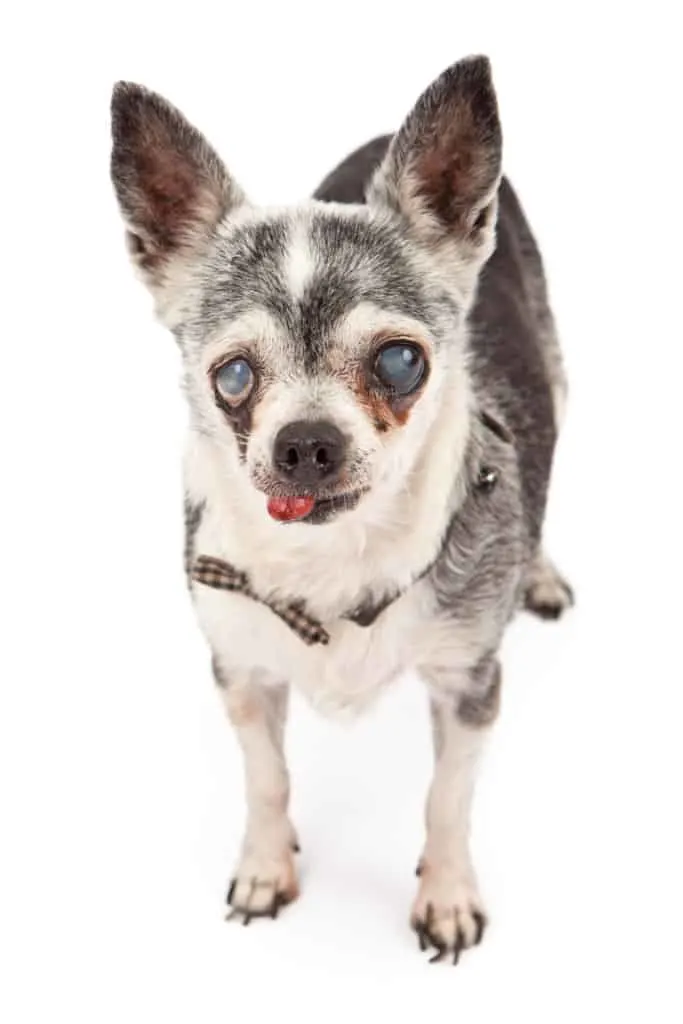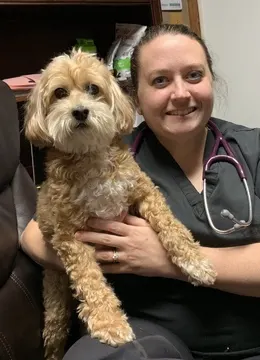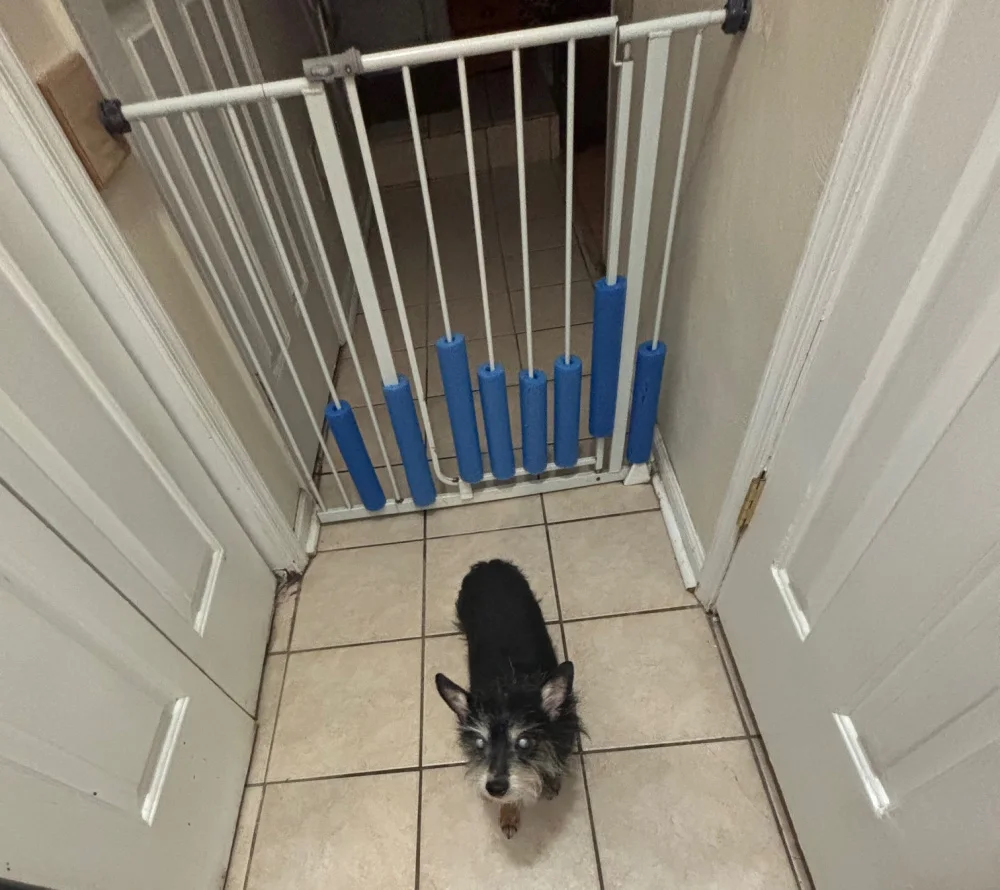
Hey there, dog lovers! If you’ve noticed your fur buddy bumping into furniture or seeming a bit hesitant when navigating the house, you might be wondering if they’re struggling with their vision.
Vision loss in dogs can be tough to spot at first, but don’t worry—we’re here to break it down for you in a way that’s easy to understand. Let’s dive into what causes vision loss, how to spot it, and how you can help your pup live their best life, even if their eyes aren’t what they used to be.
What Causes Vision Loss in Dogs?
Dogs can lose their vision for a bunch of different reasons, just like us humans. Here are some of the most common culprits:
- Old Age: As dogs get older, their eyes can start to cloud up with cataracts or other age-related changes, like nuclear sclerosis (a normal aging thing where the lens gets a bit hazy but doesn’t always mean blindness).
- Injuries: A scratch to the eye or a bigger trauma can damage their vision, sometimes permanently if not treated quickly.
- Infections: Eye infections, like conjunctivitis or uveitis, can cause trouble if they’re not caught early.
- Glaucoma: This is when pressure builds up in the eye, and it’s super painful. It can lead to blindness if not managed pronto.
- Cataracts: These cloudy patches on the lens are common, especially in older dogs or certain breeds like Poodles or Boston Terriers.
- Progressive Retinal Atrophy (PRA): A genetic condition that slowly eats away at the retina, leading to blindness. Breeds like Chihuahuas and Cocker Spaniels can be prone to this.
- Diabetes: Yep, diabetic dogs can develop cataracts super fast, sometimes in just a few months. It happened to my Lucas.
- Sudden Acquired Retinal Degeneration Syndrome (SARDS): This one’s a mystery—dogs can lose their vision almost overnight, and it’s more common in middle-aged pups.
Not so Fun fact: Smaller breeds like Chihuahuas can be more prone to certain eye issues because of their big, bulging eyes. Those cute peepers are adorable but can be a bit delicate!
How Can You Tell If Your Dog’s Losing Their Vision?
Dogs are champs at adapting, so you might not notice vision loss right away. They rely on their noses and ears a ton, which can mask the problem. But keep an eye out for these signs:
- Bumping into walls, furniture, or other objects (especially in new places).
- Hesitating to jump on or off furniture or go downstairs.
- Acting startled when you approach them suddenly.
- Cloudy or red eyes, or pupils that don’t react to light.
- Being extra clingy or anxious, especially in dim light or unfamiliar spots.
- Trouble finding their toys, food bowl, or water dish.
If your pup’s showing any of these, it’s time to chat with your vet. The sooner you catch it, the better you can help them.
Getting a Diagnosis
When you take your dog to the vet, they’ll do a thorough check to figure out what’s going on. Expect things like:
- Eye Exam: They’ll look at your dog’s eyes with special tools to check for cloudiness, pressure, or retinal damage.
- Blood Tests: These can rule out underlying issues like diabetes or infections.
- Specialized Tests: Stuff like an electroretinogram (ERG) might be used to check how the retina’s doing, especially if they suspect PRA or SARDS.
Your vet might send you to a veterinary ophthalmologist (yep, that’s a thing!) for trickier cases. These specialists have fancy equipment to get to the bottom of eye issues.
Can Vision Loss Be Treated?
The treatment depends on what’s causing the problem. Here’s the deal:
- Cataracts: Surgery is an option for some dogs, where they remove the cloudy lens and sometimes replace it with an artificial one. It’s not cheap, though, and not every dog is a good candidate.
- Glaucoma: Meds like eye drops can help manage pressure, but in severe cases, surgery or even removing the eye might be needed to stop the pain.
- Infections: Antibiotics or anti-inflammatory meds can clear up infections if caught early.
- SARDS or PRA: Sadly, there’s no cure for these. The focus shifts to helping your dog adjust to life without sight.
Not all vision loss can be reversed, but many dogs can still have a great quality of life with the right support.
Helping Your Dog Adjust to Vision Loss
If your pup’s going blind or already there, don’t stress—they can still live a full, happy life! Dogs are super resilient and lean hard on their other senses. Here’s how you can make things easier for them:
- Keep Things Familiar: Try not to rearrange furniture too much. Familiar layouts help them navigate using memory and their nose. And don’t leave things lying all over the floor where your dog will run into them.
- Use Scent and Sound Cues: Add scented markers (like a dab of vanilla extract) to key spots like doorways or their bed. You can also talk to them more or use bells on other pets to help them know what’s around.
- Create Safe Spaces: Block off stairs with baby gates and pad sharp corners. A cozy, consistent spot for their bed and bowls is a big help.
- Training Tricks: Teach commands like “step up” or “stop” to guide them safely. Positive reinforcement with treats works wonders!
- Halo Harnesses: These are cool little devices that act like a bumper, letting your dog “feel” obstacles before they bump into them.
- Exercise with Care: Stick to familiar walking routes and use a short leash to guide them. Avoid super crowded or chaotic places that might spook them.
- Pool Noodles: We use gates to block off access to certain parts of the house. Lucas can’t tell when the gate is open or closed and has more than once run into it. So I got a pool noodle at the dollar store, cut it in sections for each vertical bar on the gate and cut a slit in the noodle all the way down. These easily slip on the bars, and now if he runs into it, it won’t hurt him. You can see a photo of it below.
Pro tip: Be patient and give them extra love. Adjusting takes time, and your support makes all the difference.
Breed-Specific Risks
Some breeds are more likely to have eye troubles. If you’ve got a Chihuahua, Pug, Shih Tzu, or any flat-faced breed, their big eyes can make them prone to injuries or glaucoma. Breeds like Labradors or Miniature Schnauzers might be at higher risk for cataracts or PRA. Knowing your dog’s breed can help you stay proactive with eye checkups.
When to See the Vet
If you notice any changes in your dog’s eyes or behavior—like cloudiness, redness, or bumping into things—don’t wait. Early vet visits can catch issues before they get worse. Regular checkups are especially important for senior dogs or breeds prone to eye problems.
Living with a Blind Dog
Blind dogs can still be happy, playful, and full of personality. They’ll surprise you with how well they adapt! Focus on keeping their world predictable and full of love. There are also awesome online communities and resources (like blind dog support groups on social media) where you can swap tips with other pet parents.
Got questions or worried about your pup’s eyes? Your vet’s your best buddy for this. They’ll guide you through tests, treatments, and tips to keep your dog wagging their tail, whether they can see or not.
So have you had to deal with blindness with your dog? How have you dealt with it? Let us know in the comments!

Cathy Bendzunas
Pet Blogger

Dr. Sara Ochoa
DVM
This article has been fact-checked and approved by Dr. Sara Ochoa DVM. You can read more about her on our About page.





Susan
Friday 27th of June 2025
My 7 year old Jack Chi lost vision in her left eye a little over a year ago. My vet referred us to an animal ophthalmologist and she found the retina had detached so there was no way to restore vision. She performed retinopexy on the right eye and now that eye is saved. After a year her check up looks great and she has adjusted to having sight in only one eye. It’s very expensive but worth every penny to me to see her watching from the front window and tossing her toys around!
Cathy Bendzunas
Friday 27th of June 2025
I'm so glad you were able to save one of her eyes!
Conley
Wednesday 23rd of March 2022
Great information. Thank you, we have a chihuahua dealing with this challenge now. It came on fast and will post our results. Thanks, Conley
Cathy
Wednesday 23rd of March 2022
You're welcome Conley. hope everything works out ok with your fur baby.
Laurie
Thursday 18th of November 2021
My poor little Bailey is pretty much blind now. She’s 14 years old and had a fully developed cataract in one eye, and was overtly compensating when she walked, but she was still spunky and playful - ran to the door when the neighbour’s dog would bark. Then, what seems like overnight, the other eye developed a full cataract, and everything changed. She needs to be carried everywhere, lest she bumps into things. She whimpers all the time, and it’s really hard to get her to eat. Only eats if hand fed. I read so much about blindness in dogs, and was comforted to learn vision is not their premiere sense, but alas, she doesn’t seem to be able to compensate with her hearing. She definitely hears, but can’t tell where the sound is coming from. When I call her, she looks in every direction except where I am. She was such a happy go lucky dog up until 2 or 3 weeks ago, and now she seems so unhappy all the time. I love her so much, and I will be her eyes and transportation. I just want her to get used to this so she can get some life back.
I also have another 14 year old Lily, who is on all sorts of meds for her heart. It’s so sad to see them grow old, but I’m thankful for all the years of love we’ve shared. I’ll do anything to make the rest of their years happy and comfortable.
Cathy
Thursday 18th of November 2021
Poor Bailey. She may adjust in time. I'm so glad you are so dedicated to your senior fur babies.
Andre
Wednesday 3rd of November 2021
Hi,
My chihuahua is a puppy still, but every time I take him outside he shakes (even though we live in vegas), when I sit on the bed he starts making crying sounds nonstop until I put him on the bed with me. When he is on the bed he goes crazy and will play and run around and will lay on my chest, if I push him off he will run around me and then will settle between my legs. If I take him outside even during the day, he will begin shaking uncontrollably if I am even a few steps away. When I am close he will hide under a bush, or under my car, and will come back out. He sleeps most of the day. When he wants to eat even if the food is feet away he will chew on my hand and lick my mouth. When I take him outside he will usually urinate, and then eat, but he will quickly become confused and start shaking again and will stop eating and will start making crying sounds incessantly until I pick him up and let him rest on me. He will chew my hand and literally refuse to stop running around the bed until I pick him up. His eyes are slightly cross eyed and uneven. I have pictures. His history is I bought him from a homeless couple at a casino, and I’ve had him for about 10 days. I haven’t had time to take him to the vet yet.
Cathy
Wednesday 3rd of November 2021
Yeah he needs to be examined by a vet soon. Some of that is puppy behavior and some is typical chihuahua behavior.
Roxann Louise Crouse
Thursday 7th of October 2021
My Chi was having problems with bumping into objects, looking anxious and finally we realized something was wrong with her vision. She has been diagnosed with SARDS. Sudden Aquired Retinol Detachment. I think it's harder on me than her. I hate seeing her run into things, fall down steps and just looks confused. I need patience, positive attitude and let her learn her way. Appreciate your comments.
Cathy
Thursday 7th of October 2021
She will adjust. I'd protect her from the stairs with gates. And keep all the furniture in the same place so once she is used to where it is, she will know to avoid it. You can also get them a halo harness that will help them not to bump into things. Here's a link to one on Amazon so you can see what they are: https://amzn.to/3ah3RmV